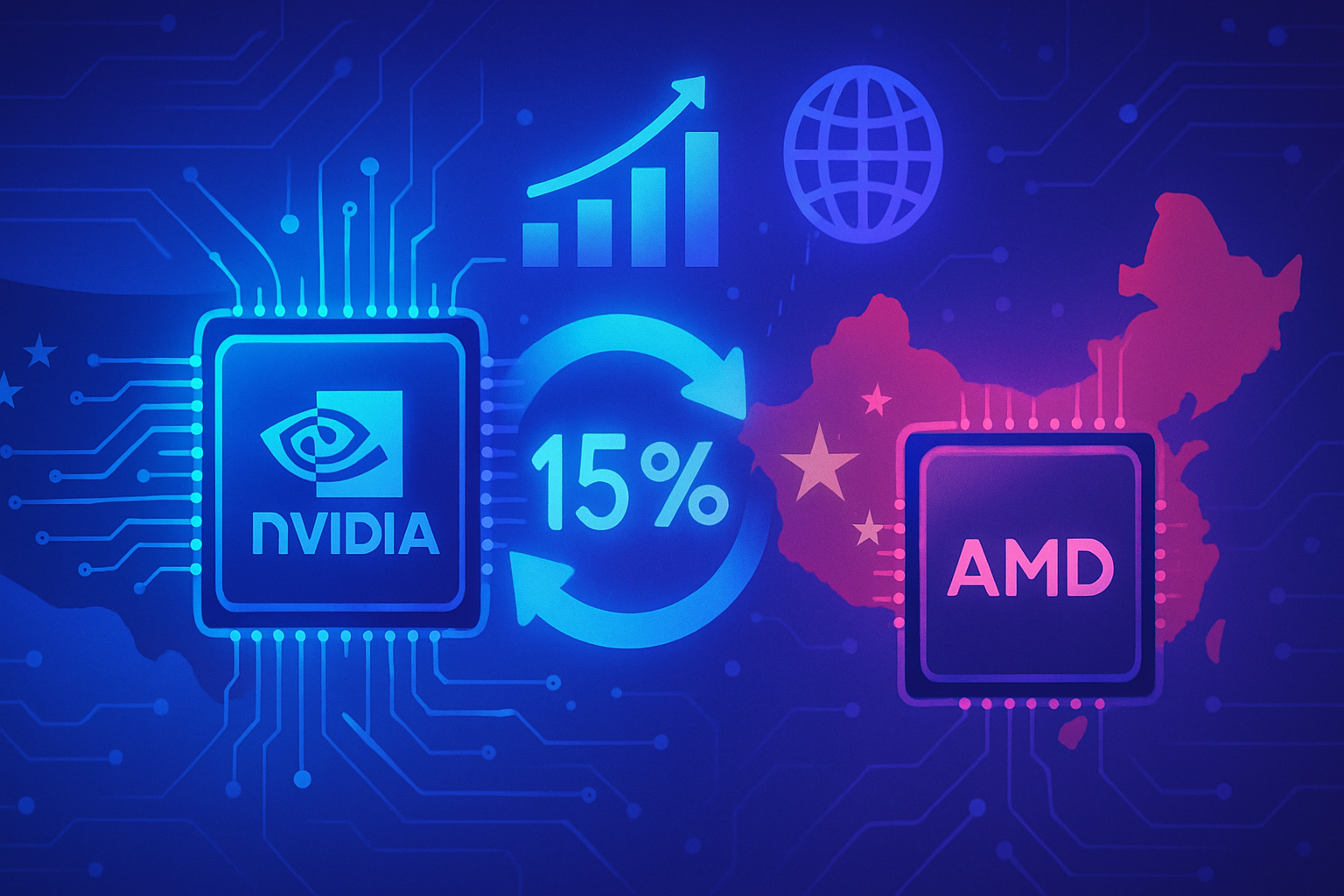Nvidia and AMD: Chip Revenues for the U.S. Government
A new alliance is forming between tech giants and the U.S. government. Nvidia and AMD are transferring 15% of their revenues from chip sales in China to the U.S. Treasury. This strategic maneuver arises from geopolitical tensions, strengthening control over the export of advanced technologies. Both companies are committed to adhering to imposed export conditions while navigating an unstable competitive landscape.
Nvidia and AMD: A Financial Commitment to the U.S. Government
Nvidia and Advanced Micro Devices (AMD) have agreed to remit 15% of their revenues from chip sales in China to the U.S. government. This decision was announced in major media reports on August 10, highlighting a significant shift in the U.S. semiconductor business landscape. The companies, moreover, play a prominent role in the technological discussions between the United States and China.
Export Licenses: Conditions Set by the Trump Administration
This measure was a stipulated requirement for obtaining export licenses for the Chinese market, approved by the Trump administration. Jensen Huang, the CEO of Nvidia, recently met with President Donald Trump, thereby confirming this exceptional arrangement. Trump indicated to Nvidia executives that he wanted them to contribute financially in exchange for the exemptions granted, even though the H20 chips involved in this decision are not the latest generation.
The implications of this decision are manifold, as they strengthen the U.S. government’s grip on the export of advanced technologies, particularly in the field of semiconductors. Companies must now navigate a complex framework that regulates access to international markets while meeting domestic requirements.
Context of Technological Rivalry: Access to the Chinese Market
Access for Chinese companies to advanced chips has become a major issue in global technological competition. Nvidia, as the world’s leading semiconductor producer, holds strategic importance in the trade relations between Beijing and Washington. Previous statements had suggested that Nvidia would resume the sale of its H20 chips to the Chinese market following a softening of U.S. restrictions.
Financial and Political Consequences
This decision could yield over $2 billion for the U.S. government, if both companies continue to grow their presence in the Chinese market. AMD, for its part, has also agreed to remit 15% of its revenues linked to the sales of MI308 chips in China, the export of which had previously been prohibited. This similar treatment reflects a strategy aligned with U.S. government requirements.
Trump also announced revisions regarding tariffs, considering applying 100% taxes on chip and semiconductor exports. Although the implementation date has not yet been specified, this announcement underscores the administration’s determination to control the semiconductor sector globally.
Market Impact and Future Perspectives
Nvidia, which recently surpassed a market capitalization of $4 trillion, reflects investors’ appetite for artificial intelligence (AI) related technologies. AI continues to transform the global economy, positioning companies like Nvidia at the heart of this transformation. The repercussions of these financial and commercial issues extend far beyond simple transactions, potentially affecting the entire dynamics of production and competition in the international tech market.
Chinese players also seem to be devising strategies to circumvent U.S. restrictions. The technological rivalry between the two nations raises various questions regarding future capabilities and innovation within the chip sector. These developments are likely to redefine trade relations over time.
For more detailed information, you can consult related articles on the recent strategies of tech giants, the issues surrounding the U.S. embargo, as well as Nvidia’s announcement about resuming the sale of its H20 chips in China.
Frequently Asked Questions Regarding Nvidia and AMD Contributions to the U.S. Government
Why are Nvidia and AMD paying 15% of their revenues from sales in China?
The companies agreed to this payment as a condition for obtaining export licenses to the Chinese market, in order to comply with the new rules established by the U.S. government.
What is the estimated total amount this payment could bring to the U.S. government?
According to sources, this agreement could yield over $2 billion to the U.S. government through contributions from Nvidia and AMD.
Does this payment impact product prices for consumers?
It is possible that the increase in operational costs due to these payments may indirectly affect product prices for consumers, but this will also depend on each company’s business strategy.
Which chips are affected by this measure?
The chips specifically affected by this payment include Nvidia’s H20 models and AMD’s MI308 chips, which are designed for artificial intelligence.
How do government measures influence the AI market?
These restrictive measures and financial contributions alter the competitive landscape and can influence investment and technological development decisions in the AI sector.
What consequences could this decision have on the technological rivalry between the U.S. and China?
This type of measure could intensify the technological rivalry between these two powers by limiting Chinese companies’ access to certain critical technologies.
What happens if Nvidia and AMD do not comply with this agreement?
Non-compliance with this agreement could lead to additional sanctions, such as the withdrawal of export licenses, thereby limiting their ability to operate in the Chinese market.
Will other semiconductor companies also be required to make similar payments?
It is possible that other companies will be subjected to similar requirements if they wish to maintain access to the Chinese market, depending on the political directions of the U.S. government.






